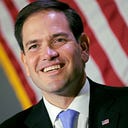Why the U.S. Should Strengthen Ties with Bahrain
By Marco Rubio
Russia’s invasion of Ukraine has brought chaos and bloodshed to Europe, but elsewhere in the world, there are heartening signs of progress.
In September 2020, Bahrain joined the ranks of Arab nations implementing the Abraham Accords, normalizing relations with the Jewish state. This February, King Hamad bin Isa al-Khalifa of Bahrain and Prime Minister Naftali Bennett of Israel met in person, marking the inauguration of a “new model” of peaceful relations between Jews and Muslims in the Middle East.
Alongside these developments, Bahrain and the United States have drawn closer together. Long a key American ally, Bahrain entered into a free trade agreement with the U.S. in 2006 and established a U.S. Trade Zone at the beginning of 2021, promoting greater economic connectivity and bilateral trade between the two countries.
The Crown Prince and Prime Minister of Bahrain, Salman bin Hamad al-Khalifa, is visiting the U.S. this week to discuss the possibility of closer cooperation between his nation and ours. The Biden Administration must capitalize on this opportunity to develop this important alliance and build on Bahrain’s implementation of the Abraham Accords.
It is easy to overlook just how groundbreaking the Accords were when first implemented in August 2020. When it comes to this historic agreement, President Biden should reject the impulse of some Democrats to undo everything achieved by former President Trump. Rather, he should build on Trump’s legacy to further the spread of peace and prosperity in the Middle East. Creating closer ties with the signers of the Accords must be a component of any such attempt.
Specifically, President Biden should work to strengthen economic relations between America and Bahrain and support Bahrain’s Economic Vision 2030 plan. Bahrainis want to wean their economy off of outsized public sector involvement, which means there is fertile ground for engagement with the U.S. private sector. This would produce more jobs and higher wages in both of our countries.
Moreover, if we foster greater economic engagement between the Abraham Accords countries and the U.S., it will undoubtedly strengthen America’s national security and that of our most vital allies in the region. It is especially important that we promote commercial investment in Bahrain’s energy sector. The Biden Administration refuses to finance international fossil fuel projects, but that only cedes influence to Vladimir Putin, who holds Europe hostage with Russia’s energy supplies, and anti-American regimes like the Chinese Communist Party (CCP).
The Arab Gulf nations are in particular danger of falling under Beijing’s influence. The CCP offers them seemingly generous loans and investment, but it only wants to import cheap oil, capture strategic infrastructure, and steal from Israel’s high-level tech sector. Beijing is fundamentally self-serving and will exploit “partner” nations whenever possible.
In many cases, developing countries work with the CCP because there appears to be no other choice. Our allies and partners need to understand the risks associated with getting too close to Beijing. They also need viable alternatives to Chinese exploitation. Providing those alternatives is one meaningful way the U.S. can push back against the CCP’s plan to remake the international order in its own image.
Joe Biden touted his decades of foreign policy experience as reason enough he deserved the presidency. The debacle in Afghanistan suggests otherwise, and the situation he faces with Vladimir Putin’s invasion and indiscriminate bombing of Ukraine is certainly less than ideal. The President’s meeting with Crown Prince Salman bin Hamad, on the other hand, is a real chance to do something good.
Bahrain is making real positive steps, and in that respect it can be a model for other Muslim-majority states in the Middle East to imitate. President Biden should offer Bahrain a real economic partnership with the U.S. to strengthen our valuable alliance, and he should communicate that we look forward to working together to make meaningful progress with Bahrain on all issues, including values, human rights, and upholding the rule of law.
